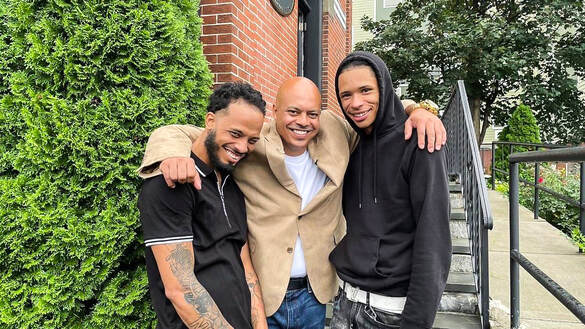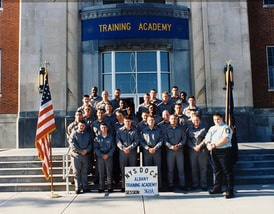Written by Giovanna Phipps and Amy Hufnagel

The Sing Sing Prison Museum (SSPM) prioritizes the importance of seeing varied perspectives, especially on criminal justice reform. This month, SSPM is highlighting the NBC podcast Letters from Sing Sing, which follows the story of Jon-Adrian “JJ” Velazquez and Dan Slepian, and Newjack: Guarding Sing Sing by Ted Conover, which tells the story of a journalist turned correction officer. Both stories paint a clear picture of what occurs behind the walls of Sing Sing Correctional Facility and share experiences in the US Justice system and the cultural/social world these individuals lived in for some time.
Dan Slepian, an NBC News producer, received a letter from Jon-Adrian “JJ” Velazquez, an incarcerated individual serving time at Sing Sing in the early 2000s. The two wrote back and forth about JJ’s case and Slepian believed that he was wrongly convicted. JJ was convicted of the murder of a retired NYC Police Officer at the age of twenty-two. Velazquez, a father to two young boys at the time of his conviction, maintained his innocence throughout his time in court and while incarcerated. There were glaring discrepancies within the case, and at the time of conviction, both JJ’s girlfriend and mother testified that he was accounted for during the time of the shooting – proving that he could not have committed the crime.
During his time at Sing Sing, Velazquez earned his bachelor's degree in behavioral science through the Hudson Link for Higher Education Program and was among a small group of incarcerated individuals at Sing Sing to live in the Honor Block, which houses those who have never received a disciplinary citation. He was appointed to the Inmate Liaison Committee, the Family Reunion Program, and the Youth Assistance Program.
Dan Slepian, an NBC News producer, received a letter from Jon-Adrian “JJ” Velazquez, an incarcerated individual serving time at Sing Sing in the early 2000s. The two wrote back and forth about JJ’s case and Slepian believed that he was wrongly convicted. JJ was convicted of the murder of a retired NYC Police Officer at the age of twenty-two. Velazquez, a father to two young boys at the time of his conviction, maintained his innocence throughout his time in court and while incarcerated. There were glaring discrepancies within the case, and at the time of conviction, both JJ’s girlfriend and mother testified that he was accounted for during the time of the shooting – proving that he could not have committed the crime.
During his time at Sing Sing, Velazquez earned his bachelor's degree in behavioral science through the Hudson Link for Higher Education Program and was among a small group of incarcerated individuals at Sing Sing to live in the Honor Block, which houses those who have never received a disciplinary citation. He was appointed to the Inmate Liaison Committee, the Family Reunion Program, and the Youth Assistance Program.
At the beginning of this project with Dan Slepian, Velazquez was serving a sentence of twenty-five years to life in prison. Through the investigation of the police reports and trial transcripts, Dan Slepian worked tirelessly to overturn JJ’s conviction. It took almost 19 years for him to be granted clemency and in 2021, Jon-Adrian Velazquez, almost forty-six years old, became a free man after serving twenty-three years for a crime he did not commit.
Since then, Velazquez has become a liaison for the Hudson Link program and has aided in the development of the Forgotten Voices Committee, and became the program director for the Frederick Douglass Project for Justice. JJ continues to fight for the wrongfully convicted and pushes for prison reform – focusing on rehabilitation rather than punishment within the criminal justice system. We are honored he is involved in the development of SSPM as part of advisory groups.
Since then, Velazquez has become a liaison for the Hudson Link program and has aided in the development of the Forgotten Voices Committee, and became the program director for the Frederick Douglass Project for Justice. JJ continues to fight for the wrongfully convicted and pushes for prison reform – focusing on rehabilitation rather than punishment within the criminal justice system. We are honored he is involved in the development of SSPM as part of advisory groups.

Ted Conover, an American journalist, decided in the late 1990s to work as a Sing Sing Correctional Facility guard to understand the complexity of this work and the culture inside the walls of this notorious prison. When his first attempt to gain access to Sing Sing was denied, Conover decided to apply for a position as a guard instead. His book, Newjack, describes the process of applying to become a corrections officer, what training entailed, the other men and women embarking on this career path, as well as his assignments to custody posts including the mental health unit, prisoner transport vehicles, and as a gallery officer. His memoirist telling explores the ideas of “care, custody, and control” in detail. Conover expresses his anger and frustration towards the system, for both corrections officers and those spending time in prison.
In chapter seven, “My Heart Inside Out,” Conover writes, “’Leave it at the gate,’ you hear time and again in corrections. Leave all the stress and bullshit at work; don’t bring it home to your family. This was good in theory. In reality, though, I was like my friend who had worked the pumps at a service station: Even after she got home and took a shower, you could still smell the gasoline on her hands. Prison got into your skin, or under it. If you stayed long enough, some of it probably seeped into your soul."
In chapter seven, “My Heart Inside Out,” Conover writes, “’Leave it at the gate,’ you hear time and again in corrections. Leave all the stress and bullshit at work; don’t bring it home to your family. This was good in theory. In reality, though, I was like my friend who had worked the pumps at a service station: Even after she got home and took a shower, you could still smell the gasoline on her hands. Prison got into your skin, or under it. If you stayed long enough, some of it probably seeped into your soul."
The complexities of the power dynamics for those who are justice-impacted, can never be understated. Velazquez, Slepian, and Conover, with their editors and networks, have spent years of their lives making sure the public has access to accurate storytelling about this huge system operating on taxpayer dollars. The American Action Forum estimates the USA spends over 1.2 trillion dollars of taxpayer money annually on the criminal justice system. And, while funding for programs and services that address the drivers of incarceration drops, funding for jails increases. From 2012 to 2019, counties outside New York City collectively spent almost $300 million more on staffing and running their local jails — an 18% increase over seven years. In 2019, the 57 counties outside New York City — which are responsible for funding their own jails — collectively spent $1.3 billion to staff and run jails. And while the economics of industry are important to understand the issues at hand, it is the humanization of the system, the human struggles, that truly help us understand what is at stake. It is this humanizing of the issues that makes Newjack and Letters from Sing Sing so compelling.
Newjack: Guarding Sing Sing is out of print but is available in audiobook format and at local libraries. Letters from Sing Sing is available wherever you listen to your podcasts.





 RSS Feed
RSS Feed